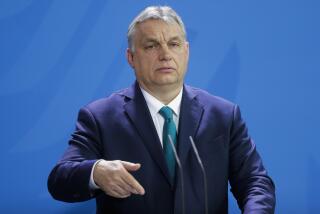Yeltsin Asks Delay of U.N. Vote on Serb Sanctions
- Share via
WASHINGTON — Fearing that taking a stand against Serbia will weaken his election chances, Russian President Boris N. Yeltsin has asked to delay a U.N. Security Council vote on tighter sanctions against Serbia beyond April 25, the date of his country’s national vote of confidence, U.S. officials said Sunday.
A vote on the U.N. measure, which would ban shipments of most goods into Serbia and open the way to seizures of Serbian funds and property abroad, had been expected as early as today. Tightened sanctions are a key to President Clinton’s diplomatic efforts to end the civil war in Bosnia-Herzegovina.
Washington has counted on Moscow’s cooperation to squeeze Serbia and persuade its allies, the Bosnian Serbs, to sign a peace agreement brokered by U.N. mediator Cyrus R. Vance and European Community negotiator Lord Owen. Bosnian Muslims and Croats already have signed the Vance-Owen accord.
Yeltsin’s opponents in the Russian Congress accuse him of selling out traditional Russian interests to the West. The Clinton Administration is anxious to avoid a Russian veto in the Security Council, which would be the first in the post-Cold War era.
As a result, Clinton’s Bosnia policy, which focuses on isolating the Serbs and rolling back their gains through diplomacy, appears to be subsumed by his Russia policy, which stresses support for Yeltsin as a democrat and an economic reformer.
“The goal posts in Bosnia seem to be getting pushed back further and further,” said a State Department official.
Over the weekend, Secretary of State Warren Christopher and his special envoy to the Bosnian peace talks, Reginald Bartholomew, negotiated both the wording and date of the U.N. resolution with Russian officials.
No decision has been reached on the timing of the Security Council vote, a senior State Department official said. The United States also is consulting with Britain, France and China, the other members of the Security Council.
Tightened sanctions were to have been the second in a series of moves designed to pressure the Serbs to sign the peace agreement and withdraw from about a fifth of the land they had captured. The first, NATO enforcement of a U.N.-imposed “no-fly” zone over Bosnia, takes effect today.
Dutch, French and U.S. planes will start enforcing the flight ban at 2 p.m., the first NATO combat mission outside alliance territory since its founding in 1949.
More to Read
Sign up for Essential California
The most important California stories and recommendations in your inbox every morning.
You may occasionally receive promotional content from the Los Angeles Times.













